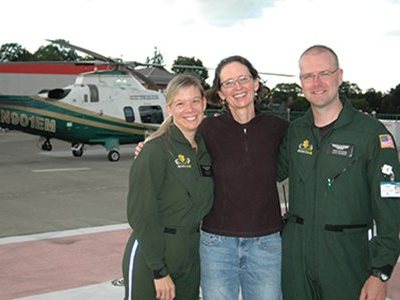
It had been a peaceful visit with friends on idyllic Matinicus, an island about 20 miles off the coast at the entrance of Penobscot Bay. Waterville resident KC Ford was on her way back to the mainland when the small plane she was on suddenly lost power and crashed into the cold Atlantic. All four souls on board survived the impact and clung to the cargo pod as the rest of the plane sank to the ocean floor 100 feet below. Residents on the island sprung into action as soon as they got word the plane went down, but the survivors still spent nearly an hour in the water before they were rescued by local fishermen and brought back to the island.
There are no healthcare facilities on Matinicus so additional planes took the injured passengers to Knox County Regional Airport in Owls Head where ground ambulances were waiting to care for the patients and transport them to Penobscot Bay Medical Center in Rockport.
Meanwhile, both LifeFlight aircraft had been requested and were enroute as emergency physicians assessed injuries and determined the care each patient needed. While they were evaluating KC, her blood pressure suddenly started to drop, an indication of major internal injuries. The flight crew, who had been in the emergency room helping to triage the patients, quickly got KC ready for the 23-minute flight to Central Maine Medical Center in Lewiston. During the trip, the crew administered fluids to counteract the effects of the internal bleeding.
Most of the details of the flight are foggy, but KC does remember an overwhelming feeling of safety and comfort. “[Flight nurse] Missy’s voice was exceptionally reassuring. After a long and incredibly scary experience, I finally felt like everything was going to be OK.”
When KC arrived at CMMC, trauma specialists there discovered she had fractured vertebrae in her lower back and shredded the protective dura surrounding her spinal cord. She had also partially transected her abdominal aorta, a very serious injury that is often difficult to diagnose, but will quickly cause the patient to bleed to death. Trauma surgeons immediately took her to surgery to repair her damaged aorta, then did a second surgery to fix her vertebrae three days later. KC spent the next 15 days in the hospital, most of it in intensive care, where physicians monitored her recovery, paying close attention to her spinal injuries.
“I received amazing care throughout my entire ordeal,” remembers KC. “It was such a traumatic time, but I was surrounded by goodness and kindness and humor and love, provided by my care givers as well as my incredible family. Everything seemed to work together to help me survive and have the will to get better. I’m the luckiest person on the planet.”
Today, KC’s life has returned to normal. Daily walks in the woods with her husband and dogs have proven to be the best therapy for her.
“I have always had a great appreciation for the outdoors,” adds KC. “Now any activity that I do, whether it be biking, hiking, camping, snowshoeing or simply walking to my car to drive to work, gives me a keen appreciation for what I am able to do. Grateful doesn’t even begin to describe how I feel.”
CREW MEMBERS
CommSpec Brian Porter
Pilot Dave Burr
Nurse Missy McCann
Medic Frank McClellan